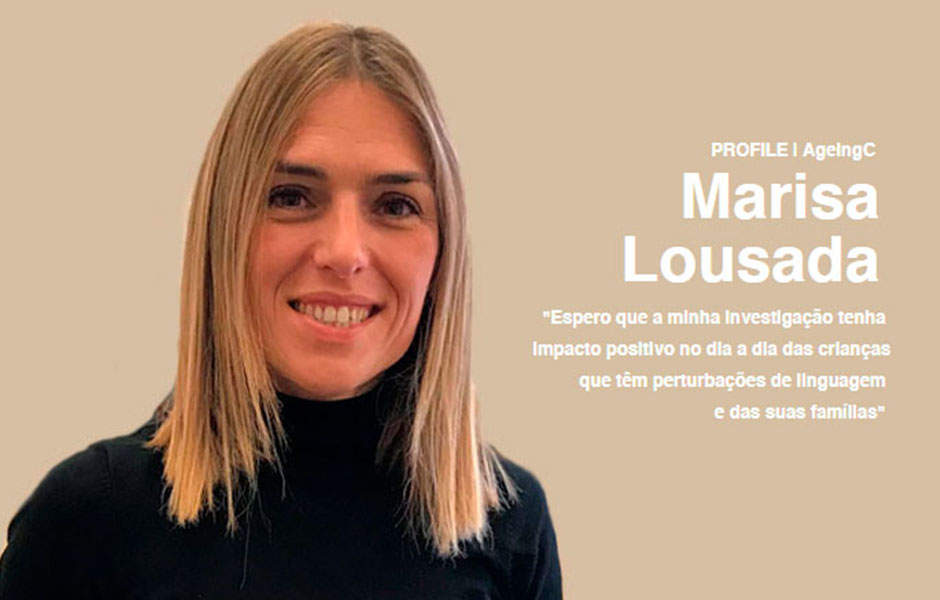Marisa Lousada has been a researcher at CINTESIS – Centre for Health Technology and Services Research for almost a decade. She is also a speech therapist, Assistant Professor at the School of Health of the University of Aveiro (ESSUA), Director of the Master’s Degree in Speech Therapy of the ESSUA, and vice-president of the Portuguese Society of Speech Therapy (SPTF). She was recently awarded the Dr. Maria Lutegarda Scientific Research Award in Rehabilitation and the Award of Scientific Merit in Speech Therapy.
She was born in Ílhavo, in 1980, and grew up in Gafanha da Nazaré. She completed her secondary education in Aveiro, her degree in Speech Therapy at the School of Health of Alcoitão, and her earned her Master’s and Doctorate from the University of Aveiro.
“I did my training in Speech Therapy always with the aim of working with children with language disorders. I started by working at the Center for Rehabilitation Medicine of Alcoitão and then at the Cooperative for Education, Rehabilitation and Inclusion of Aveiro – CERCIAV and in private practice, always in the area of Pediatrics,” she recalls.
To work as a researcher was not initially in her plans. She joined CINTESIS in 2013, shortly after finishing her Ph.D. “It made perfect sense to be in a health research unit and I chose CINTESIS because of its prestige in the area,” she says.
The advantages of being a member of CINTESIS, in her opinion, are “the fast support in research activities and some funding for specific activities”. In addition, “the meetings with the group of researchers from the Aveiro center are recurrent, which is a very positive aspect, in that it allows to enhance synergies between researchers for the benefit of interdisciplinary research.”
“Also the fact that the Unit has an FCT classification of ‘very good’ is advantageous in applications, for example, for grants for my Ph.D. students, for research projects, among others, and access to information relevant to research activities, applications for prizes, etc.,” she explains.
As a researcher, her areas of interest are the analysis of the effectiveness of intervention in children with language disorders and also the development and validation of some assessment instruments essential for the clinical practice of speech therapists.
In this sense, the funded research project that we are finishing (“Neurodevelopmental correlates of implicit-explicit learning mechanisms in children with Specific Language Impairment: Evidence with cerebral evoked potentials”), led by Ana Paula Soares, from the University of Minho, with the collaboration of the University of Aveiro/CINTESIS and the Polytechnic Institute of Porto, allowed us to better understand children with Language Development Disorder and the implications in terms of school success.
“The longitudinal study shows that language skills in the last year of preschool are strongly correlated with reading skills in 2nd grade, for example, the Percentage of Correct Consonants in preschool age and reading words and pseudowords in 2nd grade, so early diagnosis and intervention are critical,” she explains.
The main results have been, in her words, “the advancement of knowledge regarding more effective intervention approaches as well as the development of several resources, such as validated assessment instruments, which are now available on the market for speech therapists and other professionals working with children with language disorders.
For Marisa Lousada, “the scientific meetings have enabled the dissemination of these results” and “the collaboration in the direction of the SPTF in this last mandate has been an asset for the growth of the profession associated with an evidence-informed practice.
1-Year Ambitions
I aim to make some ongoing research results available to therapists and other professionals through the publication of articles, as well as the dissemination of results at international and national scientific meetings.
10-Year Ambitions
I would like my research to have a positive impact on the daily lives of children with language disorders and their families. On the other hand, I want to respond to some challenges in the clinical practice of speech therapists with regard to accurate assessment and meet those challenges with innovative assessment instruments and scientifically validated programs that can be useful in clinical practice.
Life Beyond Research
I spend time with my family, including my children, husband, parents, and grandmother. In high school, I loved to play soccer. Now I do some sports, but less than I should do. Since I use social media, I’m an open book [laughs].

